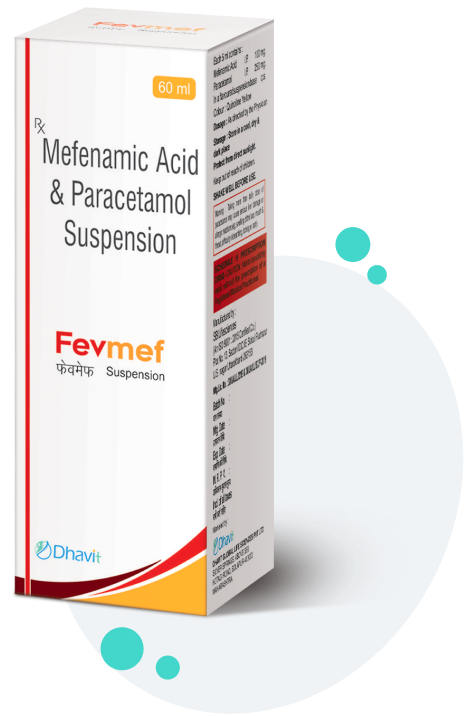
Fevmef Suspension
Composition
| Paracetamol: | 250 mg |
| Mefenamic acid: | 100 mg |
Pharmacology
Mechanism of action
Paracetamol act primarily in the CNS, increasing the pain threshold by inhibiting both isoforms of cyclooxygenase, COX-1, COX-2, and COX-3 enzymes involved in prostaglandin (PG) synthesis.
The antipyretic properties of Paracetamol are likely due to direct effects on the heat-regulating centres of the hypothalamus resulting in peripheral vasodilation, sweating and hence heat dissipation.
Mefenamic acid binds the prostaglandin synthetase receptors COX-1 and COX-2, inhibiting the action of prostaglandin synthetase. As these receptors have a role as a major mediator of inflammation and/or a role for prostanoid signalling in activity-dependent plasticity, the symptoms of pain are temporarily reduced.
Paracetamol is a widely used analgesic and antipyretic drug that is used for the relief of fever, headaches, and other minor aches and pains.
Paracetamol, unlike other common analgesics such as aspirin and ibuprofen, has no anti-inflammatory properties or effects on platelet function, and it is not a member of the class of drugs known as non-steroidal anti-inflammatory drugs or NSAIDs.
Mefenamic acid, is a nonsteroidal anti-inflammatory drug (NSAID), exhibits anti-inflammatory, analgesic, and antipyretic activities. Similar to other NSAIDs, mefenamic acid inhibits prostaglandin synthetase.
Pharmacokinetics
Paracetamol is readily absorbed from the gastrointestinal tract with peak plasma concentrations occurring about 10 to 60 minutes after oral doses. Paracetamol is distributed into most body tissues. It crosses the placenta and is present in breast milk. Plasma-protein binding is negligible at usual therapeutic concentrations but increases with increasing concentrations.
The elimination half-life of paracetamol varies from about 1 to 3 hours. Paracetamol is metabolised mainly in the liver and excreted in the urine mainly as the glucuronide and sulfate conjugates. Less than 5% is excreted as unchanged paracetamol.
Mefenamic acid is absorbed from the gastrointestinal tract. Peak plasma concentrations occur about 2 to 4 hours after ingestion. The plasma elimination half-life is reported to be about 2 to 4 hours. Mefenamic acid is more than 90% bound to plasma proteins. It is distributed into breast milk. Mefenamic acid is metabolised by the cytochrome P450 isoenzyme CYP2C9 to 3-hydroxymethyl Mefenamic acid, which may then be oxidised to 3-carboxymefenamic acid. Over 50% of a dose may be recovered in the urine, as unchanged drug or, mainly, as conjugates of Mefenamic acid and its metabolites.
Indications
Pain and fever in children.
Dosage
- 6 months – 2 years age: 1 table spoonful three times a day.
- 2-5 years age: 1-2 table spoonful three times a day.
Contraindication
- Hypersensitivity to any of the ingredients of the formulation.
- Patients with severe hepatic dysfunction
Warnings and Precautions
Use with caution in patients with renal or hepatic dysfunction, diabetes mellitus, hyperthyroidism, cardiovascular problems, epilepsy and closed angle glaucoma.
Drug interactions
Anticoagulant drugs (warfarin) -dosage may require reduction if paracetamol and anticoagulants are taken for a prolonged period of time
Paracetamol absorption is increased by substances that increase gastric emptying, e.g. metoclopramide
The risk of paracetamol toxicity may be increased in patients receiving other potentially hepatotoxic drugs or drugs that induce liver microsomal enzymes such as alcohol and anticonvulsant agents
Storage and Handling Instructions
Store below 25?C. Protect from light
Got a question?
We’d love to talk about how we can help you.